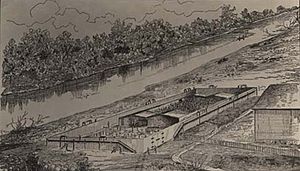Cahaba Prison facts for kids
Quick facts for kids Cahaba Prison |
|
|---|---|
| Cahaba, Alabama, U.S. | |

"Castle Morgan, Cahaba, Alabama, 1863–65. Drawn from memory by the author." From Jesse Hawes' Cahaba, A Story of Captive Boys in Blue.
|
|
| Type | Confederate Prison Camp |
| Site history | |
| Built | 1863 |
| In use | 1863–1865 |
| Battles/wars | American Civil War |
Cahaba Prison, also known as Castle Morgan, was a place where prisoners of war were held during the American Civil War. It was located in Dallas County, Alabama, in the small town of Cahaba. This prison held Union soldiers captured by the Confederacy.
Cahaba was an important town at the time, located where the Alabama and Cahaba rivers meet, not far from Selma. In 1865, the prison experienced a big flood. Cahaba Prison became known for having one of the lowest death rates among Civil War prison camps. This was mainly because the Confederate commandant treated the prisoners kindly.
Contents
Building the Prison
The Confederate Army created Cahaba Prison by building a fence, called a stockade, around a large cotton warehouse. This warehouse was located near the Alabama River. The prison officially opened in June 1863.
The main officer in charge was Captain H. A. M. Henderson, who was a Methodist minister. The prison used a brick cotton warehouse that had been built in 1860. This building was about 15,000 square feet in size. It was surrounded by a larger wooden stockade.
Prisoner Numbers Grow
Cahaba Prison was first meant to hold about 500 prisoners. However, by August 1864, the number of prisoners had grown to 660. The number of prisoners increased a lot when Union General Ulysses S. Grant stopped the practice of exchanging prisoners with the Confederacy.
By October 1864, there were 2,151 prisoners at Cahaba. This number continued to rise, reaching more than 3,000 by March 1865.
Life Inside the Prison
Former prisoner Jesse Hawes wrote about the two main officers at Cahaba. He remembered Captain Howard A. M. Henderson with good feelings. Hawes said that Captain Henderson often showed kindness to the prisoners.
However, Hawes described Lieutenant-Colonel Samuel Jones differently. He noted that Jones and Henderson did not get along well.
One young soldier named Jacob Rush joined the 3rd Ohio Cavalry when he was only 15 years old. He had not told his real age. Jacob was captured and sent to Cahaba Prison, arriving in October 1864. While there, he met Union Captain Hanchette. Together, they helped plan an escape attempt.
The prisoners managed to capture their guards. However, many of the other prisoners were too tired and discouraged to continue the escape. Confederate soldiers from the town quickly arrived, and the escape attempt failed. The prisoners involved were accused of planning a conspiracy. Captain Hanchette refused to name anyone else involved, and no other prisoners admitted to it either. The suspected planners were kept without food for four days. Both Jacob Rush and Jesse Hawes later wrote books about their experiences at the prison and the escape attempt.
Prison Conditions
R. H. Whitfield, who was the prison doctor, reported that the camp had some unhealthy conditions. He mentioned that there was not enough clean water. The main warehouse building had only one fireplace and 432 bunk spaces for all the prisoners.
Despite these challenges, Cahaba Prison had a very low death rate, about 2%. This was much lower than most other Civil War prison camps. Confederate camps usually had a death rate of about 15.5%, and Union camps had rates over 12%. Most deaths in these camps were caused by diseases. Records show that between 142 and 147 men died at Cahaba Prison.
The biggest health issue at Cahaba was constant outbreaks of flea infestations. Historians believe the low death rate was mainly due to Captain Henderson's kind treatment of the prisoners. This kindness was based on his Methodist beliefs.
Sadly, many of the prisoners who survived Cahaba Prison later died in a different tragedy. After being freed, they were traveling north on a steamboat called the Sultana. The boat sank, causing many deaths.
Prison Evacuation
In March 1865, the prison was emptied as part of a prisoner exchange. This exchange allowed Union prisoners from Cahaba to be traded for captured Confederate soldiers. The exchange happened at Vicksburg, Mississippi, on April 9, 1865. The prisoners had a long and difficult journey to get there.
See also

